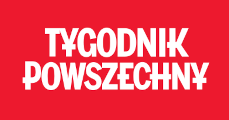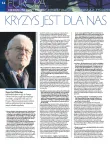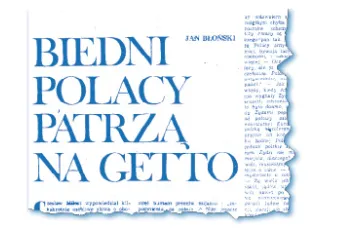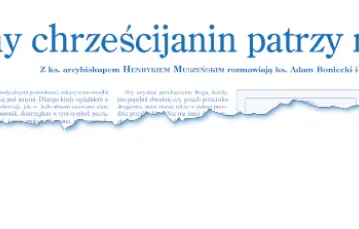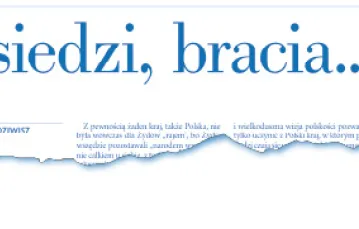Wykupienie dostępu pozwoli Ci czytać artykuły wysokiej jakości i wspierać niezależne dziennikarstwo w wymagających dla wydawców czasach. Rośnij z nami! Pełna oferta →
Many years ago common European currency was supposed to be a useful tool to help in the integration of the EU countries. Euro was presented as a material expression of the European Soul which unites the whole geo-political structure. Nevertheless, today the structure is petrified and we can no longer discuss the problem of the European Soul as its material expression seems to be a problem itself. Is it still possible to present Euro as an integrating tool?
Of course it is. It is important to note that each period has its challenges. In 1954 the great project of the European Army failed in France. Later in the 60s our French partners rejected the majority voting in the Council and there was the ‘Politik des leeren Stuhls’, or the empty chair policy, but finally it was resolved. In the 80s people spoke about Eurosclerosis and it was then that Helmut Kohl and others started their policy focused on European integration. Later we experienced the failure of the constitutional treaty in two referenda in France and the Netherlands. Then the Lisbon treaty was rejected in Ireland and people thought that this was already the end.
I followed very closely the events in the period ranging from 1999 to 2009, either from the position of the chairman of the EPP-ED group or as the President of the Parliament, and we never gave up our hope to find a solution to the problems we encountered. I think that it is very important to realize that we should not look back at the past with nostalgia. We should rather gather our strength and try to solve the problems and the challenges both of the present and of the future.
As far as Euro is concerned, the real problem does not lie in the fact that Euro is unstable. In fact, Euro itself is stable and we have almost no inflation. The true problem is the growing deficit in many countries. We have to do everything in order to comply with the Treaty of Maastricht and it has to be obeyed not only by the small countries but by the big countries with greater population as well. And behind this hides a moral dilemma as we cannot allow ourselves to have an unlimited deficit today because it will have to be paid back by the young generation of today and by the future generations. This is why we have to regain stability, and it is both a matter of ethics and politics.
At the beginning of the 90s quite a number of international experts, if not all of them, were very sceptical as to the idea of common currency and one may say they had predicted the crisis that would come in time. Now it came. In your opinion, why were they ignored?
I think they were not ignored. In all parts of human life, that means politics and economics as well, you will always be presented with a range of different opinions. The Germans and Helmut Kohl, our chancellor at that time, wanted to have political union. It is definitely a pity that this was not achieved. Right now we have to do everything to make a further step in the fight for political union and we have to do our best to create harmony in macroeconomics. And I think that in this light the crisis is a chance to go further in the direction of European integration.
The Greek crisis leads once again to the problem of the
democratic deficit in the European Union. There are only
a few leaders who decide what kind of solutions can help
to solve the problem while the rest of the European societies
is excluded from the participation in the decision-making
process and acceptance of those solutions. This is a structural flaw resulting from the way the European Union is organized and the crisis makes it only more problematic for the citizens.
I would not follow that way of thinking. I am a member of the European Parliament since 1979. And in 1979 the European Parliament had no legislative power while now the Parliament together with the Council of the European Union is the core decision-maker in most cases of European legislation. Only several fields are an exception, but in most cases we are the main legislative power. With this pencil I signed the European legislation against the climate change and this would have been impossible in 1979. Thus, I would say that, as far as parliamentarianism is concerned, we may speak of European democracy.
You are referring now to the fact that some countries take the lead in the European Council, and this is true. You probably think mainly of France and Germany. My advice in this matter is the following: in the case when France and Germany cannot find a common solution, there will be no future for the European Union, but at the same time France and Germany should always choose a policy which does not dominate the others. Thus, in the end, the decision-making process must be based on common good and all contributions and interests should be taken into consideration. I think that now the European Council has the responsibility to bring all partners together into the decision-making process.
And what is the relationship between the recent economic solutions and the legal systems of particular countries? Is it possible to solve the problems on the supranational level while they transgress the legal systems of certain EU countries? It seems that certain solutions are on the verge of particular legal systems.
The crisis connected with the national budget deficits resulted in a change of attitude. For example France is willing to change the constitution and bring the reduction of the deficit into the legal power of the constitution. I speak of the attitude of the French government in general as I am not sure what is the stance taken by the opposition there. Exactly the same happened in Spain and even in Italy. So the attitude is changing, and I think that such a change is very important for the European Union as a whole. Nevertheless, proper legislation ensuring better financial control lies still in the hands of the European Parliament and the Council of Ministers. It is there where a common solution which works both on the national and European level has to be found and a proper balance between the two should always be ensured.
In his book “The Passage to Europe" Luuk van Middelaar asks
the question whether Europe is a real entirety or whether it is
just a paper scam. He claims that our answer to that question
is always subjective since it is based on our individual
presumptions. How would you answer to this?
Europe is very real, because European integration is based on common values and our experience from the past. If you compare the Europe of 2011 with the Europe of 1939 or 1945 it is just a miracle how it has developed. And it is important to notice that it has developed in the direction where we are right now - it is based on the dignity of the human being, democracy, peace, legal order, solidarity, subsidiarity, and this was achieved because we have learned our lesson from the past. Therefore, I will always claim that European integration is a great success. Unfortunately, people are not always aware of this fact, so I think that this is our common task, both of the politicians and the media, to make it clear for the public how much we have achieved. And I think that doing so would be a very good foundation for the future.
This is the argument from the past. But what will be the future
of the European Union? How far can we go? How far can we
move on with this crisis? Will it be possible to incorporate new
countries into the European Union?
I think that this is not the best time to speak about new countries joining the European Union. At the moment there are 27 countries with 500 mln people and we have to focus on the consolidation of the European Union as it is today. If the European Union was to be enlarged by bringing in more and more countries it would only weaken the EU, and this is why I am not in favour of such an ideal. What we need right now is, first of all, a policy of good neighbourhood in order to build relations with our neighbours which will always fit into the particular political and economical situation. I think that right now it is not necessary to think of further enlargements. Of course, except from the Balkan countries which are going to join the European Union step by step. However, it is impossible to compare the countries with each other as for some of them, like Croatia, the process will be quick, but for others, such as Serbia, it will take a bit longer and Albania may need even more time.
Turkey is also somehow a Balkan country, but I don’t think you include Turkey in the countries that will join the EU.
I think it is vital for the European Union to have a stable and good relationship with Turkey. Nevertheless, I think it would be too much for the European Union, politically, culturally, financially, geographically etc. to have Turkey in the European Union. But even though I say this, I am still an advocate for very strong, good relations with Turkey.
You mentioned the cultural difficulty, but there may also be a question of religion here. What I mean is that Europe is somehow a Christian club. Do you think that this is also one
of the reasons?
I cannot accept the term ‘Christian club’. Personally, I would like the European Union to be more Christian. And if the Prime Minister Erdogan describes the European Union in a way which is not reality, he expresses indirectly the fact that we are culturally different. However, I think that we can still learn from each other. For example: the Konrad Adenauer Foundation, which I am the chairman of, yesterday had its day, ‘Konrad Adenauer Tag’, and the major topic of that event was the migration and integration. I think that it is most important to accept that the dignity of human beings applies not only to Europeans or Christians but to Muslims, Jews, non-believers as well. In general, it is equally relevant for everyone on this Earth.
If we may concentrate for a moment on the question of Islam. In Europe, and lately in New York as well, there are many controversies concerning mosques built in Western cities which are traditionally, or at least should be, or may be, Christian. When I listen to the arguments of the advocates for building mosques in Western countries I feel quite convinced. However, when I am faced with the arguments of the opposition some of them seem rational. Who is right?
Each human being on this Earth has the right to express their religious belief. This applies to Muslims in the Western world, but it also applies to Christians in the Muslim world as well. When I am visiting Arab countries I am often asked how Muslims live in Europe. My answer is that they have their own prayer houses, they do have their mosques and they have the right to have them because the freedom of religion and the freedom to express your religious beliefs are basic human rights. However, it should apply to the Christians who live in the Arabian countries as well, while the situation there proves to be quite different.
I could give you many examples. For instance, you may encounter churches in Oman and in all those countries where there are thousands of immigrant workers coming for example from the Philippines or India and who are Christian. However, in Saudi Arabia there is not a single Christian church. And this is why we have to demand from Saudi Arabia to build Christian churches if they ask us to build mosques in Europe. This is very important.
I have just visited the north of Iraq. I was in Kurdistan in Erbil and I think that it is very important for the Christians to remain in the region. The fact that different religions live peacefully together helps Muslims, the Shias and the Sunnis, to live peacefully together as well. And so, it’s very important for us to defend those ideas and ideals.
I think that it is important to accept that people are different but when people come to our country as immigrants they also have to accept our constitutional system and our society. It would be very bad for the whole society if in the end everything would lead us to the emergence of excluded areas and societies just like in the case of the Jewish ghettos in the past. First of all, people should communicate and that’s why proper education in kindergartens and schools is so important. We should have a better understanding of Islam and we should be able to accept it as a part of our society. On the other hand, Muslims also have to do whatever they can in order to be integrated into this society. This problem will always have those two sides and the work must be done both on the part of the immigrants and on the part of the countries which welcome them.
The Arab Spring was, or still is, a great challenge for the
European Union. It concerns especially the Schengen
idea of Europe without borders. While the others were
complaining about the massive wave of immigrants, you
were the one who could observe the positive sides of this
revolutionary change. I don’t mean the advantages on the
part of the immigrants but the positive sides for Europe. What are they?
First of all, if you go two years back almost nobody would have thought that on the part of the Arab countries there would be this will for freedom, liberty and democracy. It is a wonderful development that the young generation demands on having democracy. I had a marvelous experience when, at the beginning of March, I was in Cairo and I spoke to the people on the Tahrir place. I also visited Tunisia. And I could see this wonderful development. Nevertheless, when people start a peaceful revolution you may never be sure that they will win in the end. I think that now this is our great challenge, and I believe that democracy has a chance of success. Even though we have no guarantee of success we should still support that idea. These are the values that we treasure. How can we refuse to give them to others who are asking for them? I think that the European Union should make an effort to support democracy at all times. Our Konrad Adenauer Foundation has representation in many places: Rabat, Tunis, Cairo, Amman, Jerusalem, Ramallah, Abu Dhabi and we may still extend it. What we can offer, if it is wanted, are our modest possibilities to support democracy and legal order in those countries. I think that it is very important for the European Union to have countries in the north of Africa and the Middle East which are based on democracy.
To support democracy in North Africa is one thing - another is to accept the massive immigration...
I think that we need a structure for immigration. It is terrible when people are forced to go into boats and they are later killed in the Mediterranean after paying all their money to the gangs. I am in favour of the coordinated immigration policy. In this way people in North Africa can apply for visas for a restricted time. After visiting the embassy and obtaining a visa they can come to our country for some time. This will prevent people from getting into those terrible boats. We must find new solutions for the immigrants. I am also very much in favour of the exchange programme for students and similar ideas. On the other hand, one thing is certain: we cannot have millions and millions of people from Africa coming to the European Union.
We could already notice on the example of France and other countries that people do not integrate so easily as we would like them to do it. Of course, there are no solutions which are perfect but the value underlying all our actions should always be that we see the dignity in all human beings. We certainly can never allow for the situation of people being killed in the Mediterranean to continue.
The conference we have just attended is devoted to the role
of the Catholic Church in the process of European integration.
Only a few years ago integration meant something slightly
different than it means now. Europe was on the rise while now
it is in danger. How Christian Democrats or the Church are
going to heal the critical atmosphere now?
I would say that we already have enough challenges. The European Union was very successful and the membership of Poland is an example of what has changed for the better. I think that it was good and I think Christians could give people the right message that we have confidence. Pessimists can never solve challenges because they follow a self fulfilling prophecy. It means that everything is bad and the worst thing might come. On the other hand, an optimist believes that the situation can improve even though we never have certainty that it will come true. No matter what the odds are, there is always the chance of success, and I believe that confidence and hope is what the Christian Church can bring into the atmosphere of the crisis right now. Let us take the late Pope John Paul II. as an example. I was there in Rome in May when he was beatified. He had said something very important to his Polish fellow countrymen: “Don’t be afraid!," and I think this is what is important. We should not be afraid, and neither should we be naive, but we certainly should be hopeful. This attitude of hope and confidence can help us in solving the challenges that we have to face.
Do you expect any particular results of this year’s conference?
I expect that this conference will give us the conviction that or that it will strengthen the belief that Christians can help us work for a better Europe. We believe in the dignity of the human being and this is the sense and the basis of everything. As Christians we have confidence and hope for the future. We know we are unable to create a paradise on earth, but still we will go in the right direction which will lead us to the benefit of all human beings.
Hans-Gert Pöttering (1945) is a german conservative politician (CDU, European people’s party), and was the president of the European parliament from january 2007 to july 2009. on 4 december 2009 he was elected chairman of the konrad adenauer foundation. he has served as a member of the European parliament continuously since the first elections in 1979 and thus is its longest-serving member, and was chairman of the European people’s party-European democrats 1999-2007.
